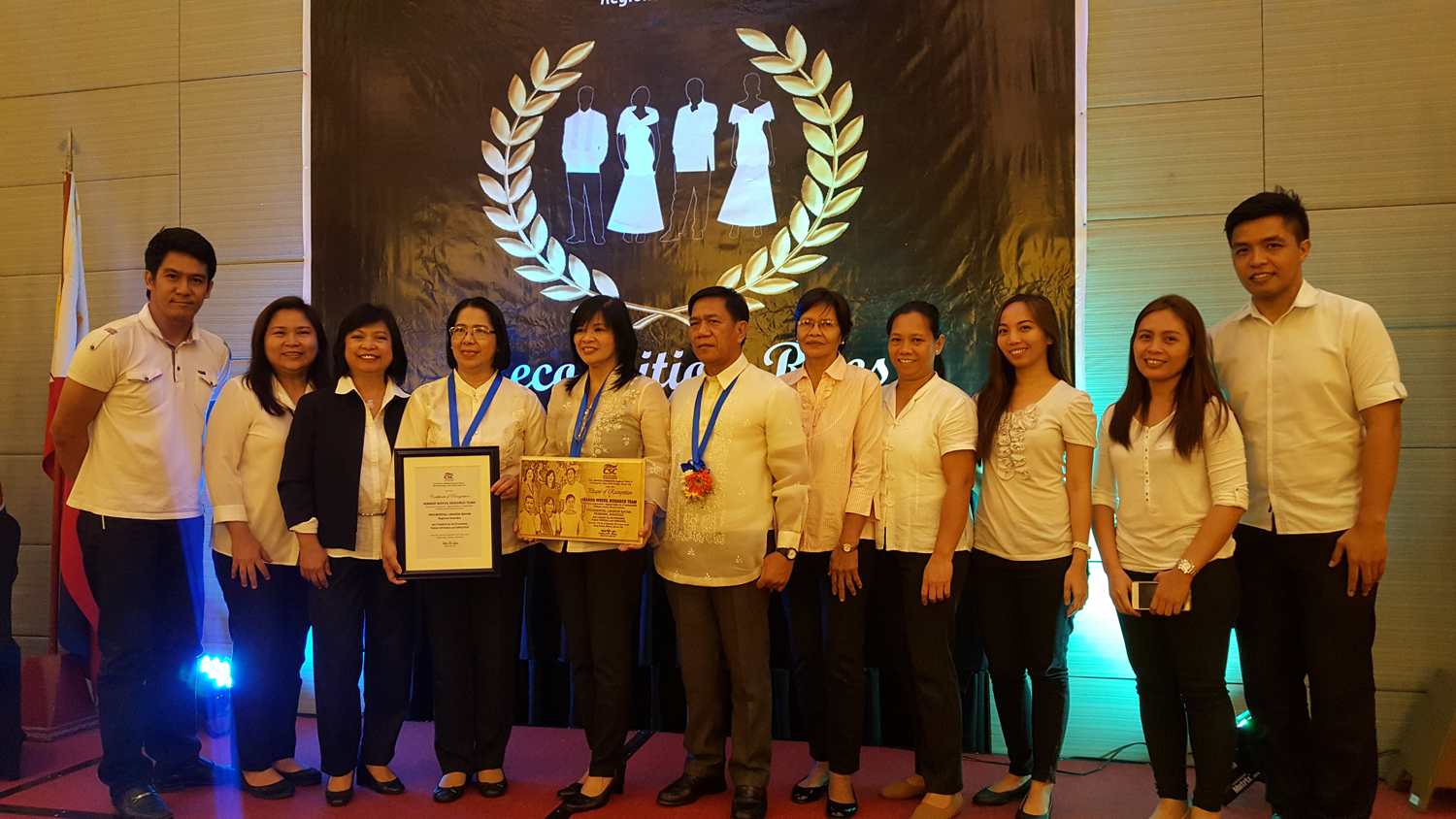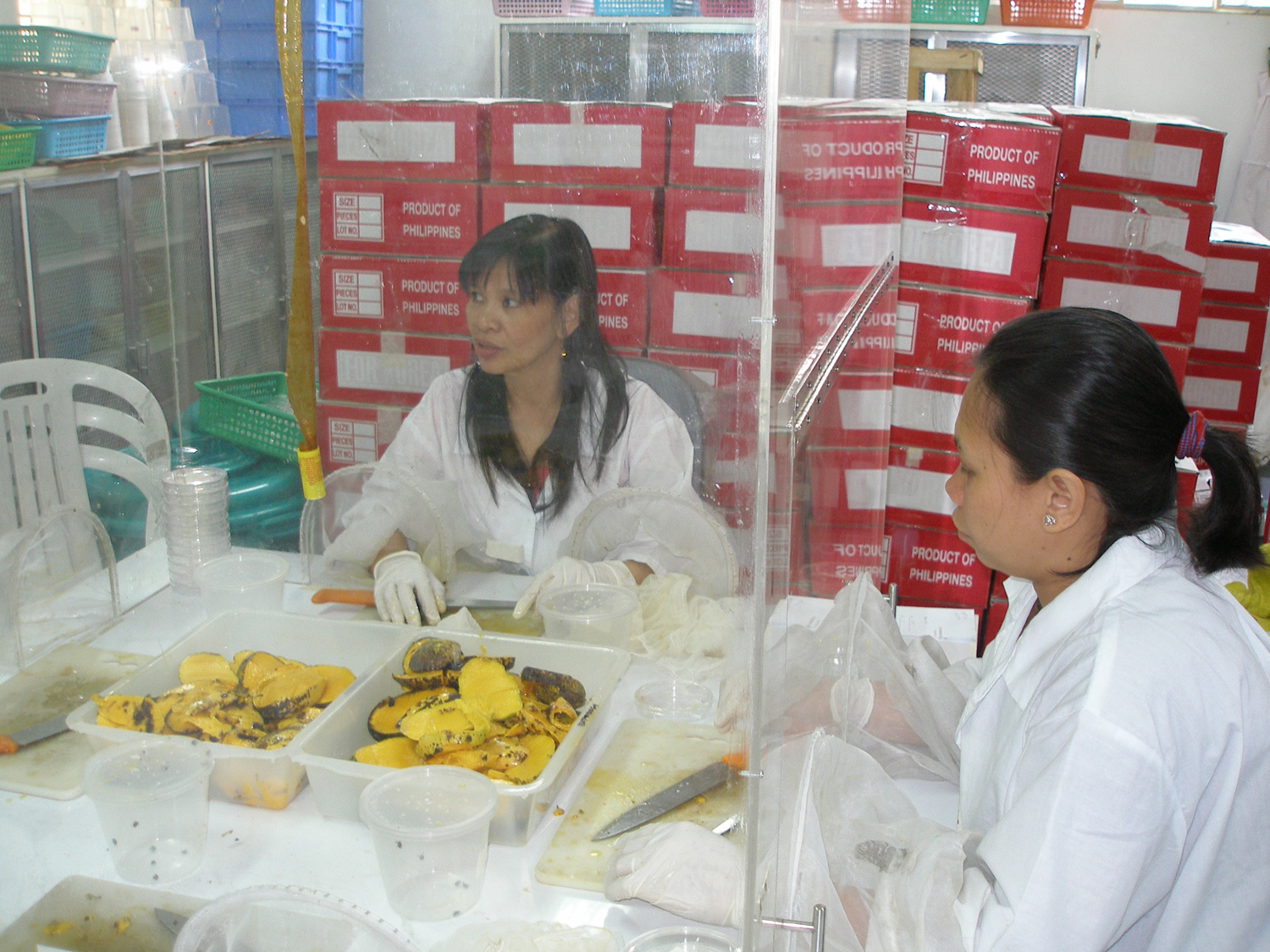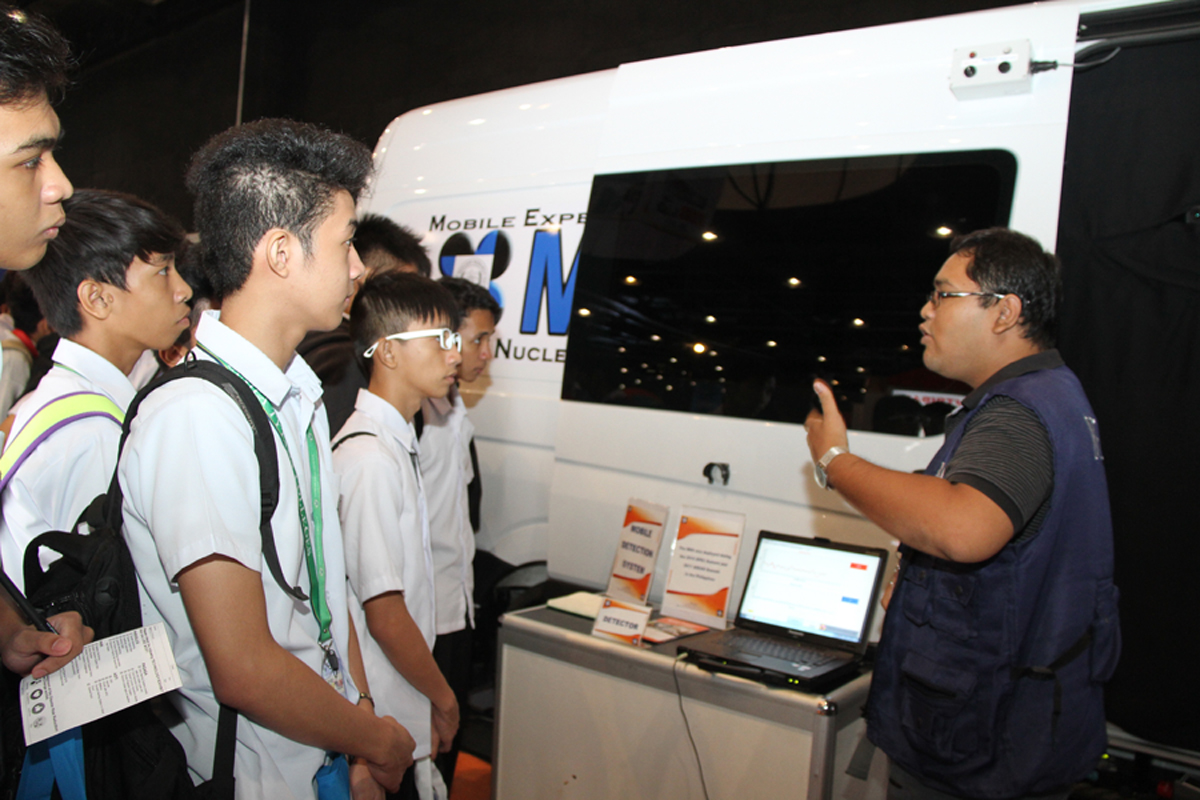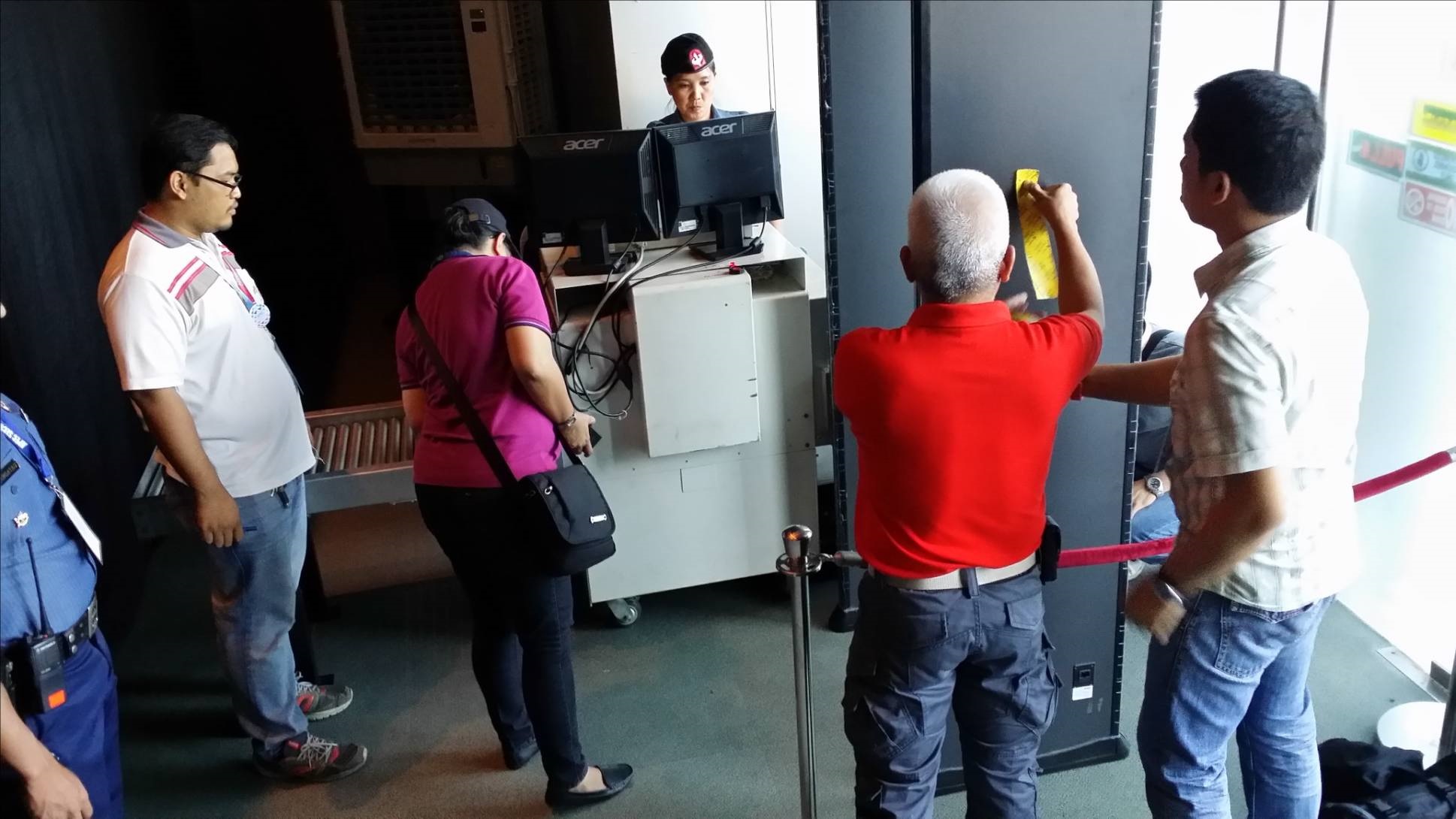PNRI Researchers Win the Presidential Lingkod Bayan Regional Award
- Details

Ms. Glenda Obra, Scientist I and head of the PNRI Agriculture Research Section (5th from left), Mr. Sotero Resilva, Science Research Specialist (6th from left), and Ms. Luvimina Lanuza, head of the PNRI Irradiation Services Section (4th from left) with PNRI Atomic Research Division Chief Dr. Soledad Castañeda (3rd from left) and PNRI researchers during the awarding of the 2017 Presidential Lingkod Bayan Regional Award at the Luxent Hotel in Quezon City.

Dissection of irradiated and unirradiated mango-pulp weevil-infested mangoes at the PNRI Mango Pulp Weevil Holding Laboratory.
PNRI Researchers Win the Presidential Lingkod Bayan Regional Award
For their pioneering work in enhancing the quality of Filipino mango exports, agriculture specialists from the Department of Science and Technology – Philippine Nuclear Research Institute (DOST-PNRI) were awarded with the 2017 Presidential Lingkod Bayan Regional Award by the Civil Service Commission (CSC) as part of the Mango Weevil Research Team, which utilized irradiation as a quarantine treatment against the mango pulp weevil Sternochetus frigidus (Fabr.).
Ms. Glenda Obra, Scientist I and head of the PNRI Agriculture Research Section, along with Mr. Sotero Resilva, Science Research Specialist, and Ms. Luvimina Lanuza, head of the PNRI Irradiation Services Section, were among the awardees from PNRI on September 11 at the Luxent Hotel in Quezon City.
Also among the awardees were their collaborators from the Department of Agriculture, namely Dr. Louella Lorenzana, Mr. Edison Bauzon and Ms. Elvira Litan.
The PNRI-developed quarantine treatment, which involves exposing the mangoes to gamma irradiation, is the first and only one of its kind worldwide for mango pulp weevil. Based on PNRI’s research studies, a minimum radiation dose of 165 gray (Gy) is enough to make the adult mango weevil sterile, providing sufficient quarantine security for Philippine Super Mangoes. The irradiation treatment is also more cost-effective than the conventional vapor heat treatment, saving farmers up to half a million pesos per hectare.
Quarantine pests such as the mango pulp weevil prevent our country’s mango exports from entering international markets such as the US and other countries with strict quarantine regulations. The wasted potential aggravates the economic woes of the local mango growers and exporters who contribute a substantial share of the Philippines’ total agricultural exports.
A cooperation agreement late in 2006 between the PNRI, the DA and the US Department of Agriculture (USDA) began the development of the quarantine treatment, aiming to allow Filipino mango exports to enter the United States.
After years of research and public consultations, the quarantine treatment was finally approved in 2014 in the United States and subsequently published under a final rule in the US Federal Register. As per the final rule, the Philippines also succeeded in getting the US government to recognize most of the mango-producing regions of the country as pulp weevil and seed weevil-free areas.
Its success is also reflected by its inclusion in the USDA Plant Protection and Quarantine Treatment Manual, and the treatment will eventually be used in all countries with the mango pulp weevil, particularly in Southeast Asia.
PNRI Ensures Nuclear Safety in ASEAN Events
- Details

A member of the PNRI Mobile Expert Support Team (MEST) discusses about the Mobile Detection System (MDS) van previously used by PNRI and police personnel during the APEC and ASEAN summits.

PNRI MEST teams and AFP personnel in action.
PNRI Ensures Nuclear Safety in ASEAN Events
Working hard to ensure the safety and security of world leaders and other participants from possible nuclear or radiological incidents, the Department of Science and Technology – Philippine Nuclear Research Institute (DOST-PNRI) deployed its Mobile Expert Support Teams (MEST) as the Philippines hosted the Association of Southeast Asian Nations (ASEAN) 2017, in time for the intergovernmental organization’s 50th anniversary.
With their expertise in nuclear science and radiation protection, the PNRI MEST teams provided assistance to members of the Philippine National Police (PNP) and the Armed Forces of the Philippines (AFP) in carrying out security measures to prevent the unauthorized presence of nuclear and other radioactive materials during major meetings and activities, most of which were held from August 2 to 8.
These include the Grand Commemorative Celebration of ASEAN’s 50th Anniversary, the 50th ASEAN Annual Ministerial Meeting, and other important general ASEAN events being held at the Philippine International Convention Center (PICC) in Pasay City.
PNRI has also previously provided its expertise during major international events hosted by the Philippines, such as the Asia-Pacific Economic Cooperation (APEC) Summit on November 18-19, 2015, and the more recent 30th ASEAN Leaders’ Summit held on April 26 to 29, 2017.
Beyond the use of PNRI’s state-of-the-art radiation detection equipment, MEST experts were also instrumental in various training courses, seminars and workshops for police and military personnel involved in Chemical, Biological, Radiological and Nuclear Emergency (CBRNE) response actions.
These training efforts were conducted with the invaluable support of the United States Department of Energy - National Nuclear Security Administration (USDOE-NNSA) and the International Atomic Energy Agency (IAEA).
Dr. Carlo Arcilla Takes Oath as New PNRI Director
- Details



The Department of Science and Technology – Philippine Nuclear Research Institute (DOST-PNRI) welcomes its new Director, Dr. Carlo Arcilla. DOST Secretary Fortunato Dela Pena administered the oathtaking on August 1 at the PNRI auditorium in the presence of DOST Undersecretary for Research and Development Dr. Rowena Cristina Guevara, the PNRI senior staff and the employees of the Institute.
A proven expert in the field of geology, Dr. Arcilla previously served as the Director of the National Institute of Geological Sciences (NIGS) at the University of the Philippines - Diliman. Dr. Arcilla has also been involved in nuclear-related research for more than a decade, particularly in studies on nuclear waste disposal.
PNRI Scientist Receives Outstanding R&D Award for Applied Research
- Details


The Department of Science and Technology – Philippine Nuclear Research Institute (DOST-PNRI) congratulates Dr. Lucille Abad, Scientist I and head of the PNRI Chemistry Research Section, for receiving the Outstanding Research and Development Award for Applied Research (Julian A. Banzon medal) for her outstanding research on “Radiation Modified Carrageenan as Plant Food Supplement (CPFS)” that proved to be effective as plant growth promoter. The award was given during the opening ceremonies of the 2017 National Science and Technology Week on July 11, 2017 at the World Trade Center in Pasay City.
In a world where economic progress is driven largely by the ever-increasing efficiency and quality of raw materials and finished products alike, Dr. Abad. stands out as one of the Philippines’ leading innovators in the field of chemistry today.
A Scientist I under the Scientific Career System with a Ph.D. in Nuclear Engineering and Management from the University of Tokyo, her devotion to the potentials of radiation technology has allowed Dr. Abad and her team of researchers under the Department of Science and Technology - Philippine Nuclear Research Institute (DOST-PNRI) to develop effective products that will serve agricultural, industrial, medical and environmental purposes alike through the use of natural polymers.
Dr. Abad is looking forward to the potential of radiation processing in improving the quality of a variety of products, from industrial semiconductors, wires and cables to more domestic materials such as abaca fibers and other fabrics. Among the radiation processed products she has developed her projects is the well-tested carrageenan plant food supplement.
Made from a common ingredient derived from red seaweed, the formula was turned into an agricultural miracle by ionizing radiation, allowing a few liters to increase the yield of entire hectares of ricefields by over 20 percent while also making them more resistant to bacterial leaf blight and tungro bacilliform virus infestations. This product is currently also being tested in other crops such as mungbean, peanuts, pechay and leafy vegetables with great potential of having exceptionally high increase in yield.
The carrageenan plant food supplement was not the first time that Dr. Abad worked on carrageenan using radiation processing. PNRI’s previously developed carrageenan polyvinyl-pyrrolidone hydrogel wound dressing is also made from similar materials and is a medical marvel for healing burns, wounds and bedsores while keeping the soothing sensation of its gel structure. She started this work early in 2000, adapted from her studies as a fellow at the Technical University of Lodz, Poland.
A prolific contributor in her field, she has authored several publications in refereed journals and has given lectures/seminars and poster presentations to both local and international audiences. Currently, she has one patent and a utility model and three pending patents on record.
Her vision coupled with her no-nonsense work ethic has already earned Dr. Abad and her team many awards, including the 1st prize in the Annual Aquatic Technology Competition and Marketplace of the Natural Aquatic Resources Research Development System in 2006; 2nd place in the Likha Award in the Health, Education and Environment category of the DOST National Inventor’s Week in 2000; 3rd prize in Best Research sponsored by PCASTRD in 2001; 3rd place in the 1982 NSTA Outstanding Research Award (a slot as a national finalist in the 1st ASEAN Search for Young Scientist in 1989).
Dr. Abad’s various publications in ISI journals have also made her the recipients of the DOST International Award for four consecutive years. More recently, Dr. Abad won first place during the poster competition at the International Meeting on Radiation Processing (IMRP) in Vancouver, Canada, having bested the submissions of researchers from over 80 countries. She has also established herself with linkages with the International Atomic Energy Agency as well as various nuclear institutes especially in Asia, attending international conferences, meetings and expert missions/consultancies, along with fellowships in Japan, Poland and USA.
Certainly, there is more to Dr. Abad than her laurels. From her humble beginnings in Cebu City, she obtained her Bachelor of Science in Chemistry at the University of San Carlos and her Master’s degree in the same field at the University of Santo Tomas. She rose through the ranks under the then-Philippine Atomic Energy Commission (now PNRI) in 1982, and she has long since proven herself as a leader and administrator, currently heading PNRI’s Chemistry Research Section. In 2011, she was conferred with the Dangal ng Bayan Award by the Civil Service Commission as a testament to her achievements as a public servant and a true scientist for the people.
In a world where economic progress is driven largely by the ever-increasing efficiency and quality of raw materials and finished products alike, Dr. Lucille Abad stands out as one of the Philippines’ leading innovators in the field of chemistry today.
A Scientist I under the Scientific Career System with a Ph.D. in Nuclear Engineering and Management from the University of Tokyo, her devotion to the potentials of radiation technology has allowed Dr. Abad and her team of researchers under the Department of Science and Technology - Philippine Nuclear Research Institute (DOST-PNRI) to develop effective products that will serve agricultural, industrial, medical and environmental purposes alike through the use of natural polymers.
Dr. Abad is looking forward to the potential of radiation processing in improving the quality of a variety of products, from industrial semiconductors, wires and cables to more domestic materials such as abaca fibers and other fabrics. Among the radiation processed products she has developed her projects is the well-tested carrageenan plant food supplement. Made from a common ingredient derived from red seaweed, the formula was turned into an agricultural miracle by ionizing radiation, allowing a few liters to increase the yield of entire hectares of ricefields by over 20 percent while also making them more resistant to bacterial leaf blight and tungro bacilliform virus infestations. This product is currently also being tested in other crops such as mungbean, peanuts, pechay and leafy vegetables with great potential of having exceptionally high increase in yield.
The carrageenan plant food supplement was not the first time that Dr. Abad worked on carrageenan using radiation processing. PNRI’s previously developed carrageenan polyvinyl-pyrrolidone hydrogel wound dressing is also made from similar materials and is a medical marvel for healing burns, wounds and bedsores while keeping the soothing sensation of its gel structure. She started this work early in 2000, adapted from her studies as a fellow at the Technical University of Lodz, Poland.
A prolific contributor in her field, she has authored several publications in refereed journals and has given lectures/seminars and poster presentations to both local and international audiences. Currently, she has one patent and a utility model and three pending patents on record.
Her vision coupled with her no-nonsense work ethic has already earned Dr. Abad and her team many awards, including the 1st prize in the Annual Aquatic Technology Competition and Marketplace of the Natural Aquatic Resources Research Development System in 2006; 2nd place in the Likha Award in the Health, Education and Environment category of the DOST National Inventor’s Week in 2000; 3rd prize in Best Research sponsored by PCASTRD in 2001; 3rd place in the 1982 NSTA Outstanding Research Award (a slot as a national finalist in the 1st ASEAN Search for Young Scientist in 1989). Dr. Abad’s various publications in ISI journals have also made her the recipients of the DOST International Award for four consecutive years. More recently, Dr. Abad won first place during the poster competition at the International Meeting on Radiation Processing (IMRP) in Vancouver, Canada, having bested the submissions of researchers from over 80 countries. She has also established herself with linkages with the International Atomic Energy Agency as well as various nuclear institutes especially in Asia, attending international conferences, meetings and expert missions/consultancies, along with fellowships in Japan, Poland and USA.
Certainly, there is more to Dr. Abad than her laurels. From her humble beginnings in Cebu City, she obtained her Bachelor of Science in Chemistry at the University of San Carlos and her Master’s degree in the same field at the University of Santo Tomas. She rose through the ranks under the then-Philippine Atomic Energy Commission (now PNRI) in 1982, and she has long since proven herself as a leader and administrator, currently heading PNRI’s Chemistry Research Section. In 2011, she was conferred with the Dangal ng Bayan Award by the Civil Service Commission as a testament to her achievements as a public servant and a true scientist for the people.












































